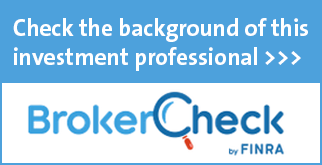How do I know if my financial advisor is doing a good job?
Nowadays it can be equally hard for people who are currently working with a financial advisor, or seeking professional help with their personal finances for the first time, to know if they are working with the right financial professional. There can be some nuances and gray areas in our professional field, but we wanted to offer our honest opinion on this common question: How do I know if my financial advisor is doing a good job?
Financial advice should be collaborative, non-judgmental, compassionate, smart and holistic. In order to deliver this type of quality advice, we believe a financial advisor is doing the best job possible for their clients when they are:
- Asking questions about a client’s whole picture before recommending solutions.
- Being proactive and strategic, not just in it to get a piece of their client’s portfolio.
- Speaking from deep knowledge and experience. They should have a solid professional background in the subject matter that they are advising their clients on through education, work experience, and proper licenses and certifications.
- Helping navigate their clients on their financial journeys towards successful outcomes.
- Recommending strategies and solutions in the client’s best interest above their own.
In addition to these best practices above, here are some additional questions that you can ask when evaluating whether or not to work with (or keep working with) a financial advisor.
Is the advisor transactional or relational?
Transactional financial advisors can be good at being very knowledgeable about a particular financial product, but they may not be trying to cultivate a deep relationship with their clients. They are less likely to keep in touch with their clients after an initial advising period or sale of a product. Not all of them are bad people, but because many of them are driven by sales and commissions, they may end up recommending products that may not be the best course of action to help their clients meet their important goals.
Relational financial advisors are exactly the opposite,and better in our opinion at recommending proactive strategies for their clients because they like building long-term relationships, and want to invest time and energy to really get to know their clients. Relational financial advisors are also resourceful. They maintain close ties and connections with a larger community, and facilitate those introductions when needed.
How does the financial advisor get paid?
Good, ethical financial advisors take time to clearly explain the fees they charge their clients through the investments they manage, the hourly or retainer fees, or the commissions they may earn through any products they sell. Advisors can be “fee-only” (compensated solely by the client, and they receive no additional compensation from the sale of any one product); or they can be “fee-based” (compensated both by the client, but also can also receive additional compensation from the sale of or purchase of a financial product); or they can be paid solely from the sale or purchase of a financial product.
Does the advisor take time to learn about your goals and values?
Goals and values keep us motivated over the long-term and drive our decision-making. If a financial advisor is recommending things to you that don’t fit your values, then speak up and explain why and give the advisor a chance to gain a better understanding of who you are and what is most meaningful to you.
Is your advisor helping you build a stronger, healthier relationship with money?
Money is very personal and often intimidating; and it can bring up a lot of feelings. Society has made talking about money a taboo subject. Many of us grow up with very little financial literacy, and a financial advisor should be an ally who is empowering you to make more informed, positive decisions with your money. You should feel comfortable reaching out to them anytime you have a question related to personal finances or wealth decisions. Your financial advisor should be the one person who you can have a conversation with about money and wealth without the intimidation or pre-judgement. If you are in a relationship, then they should make it a priority to include, share information and updates with both partners around the family’s wealth management decisions.
—
Nicole Middleton, CFP® is a Wealth Advisor and Co-founder of Strategy Squad. She and her team are individually empowering, fiduciary advisors that create and cultivate deep relationships with clients to help maximize their ability to plan for and achieve their life goals through holistic financial advice. Website: www.strategysquad.com | Instagram: @strategysquad | Phone: (888)657-7823

